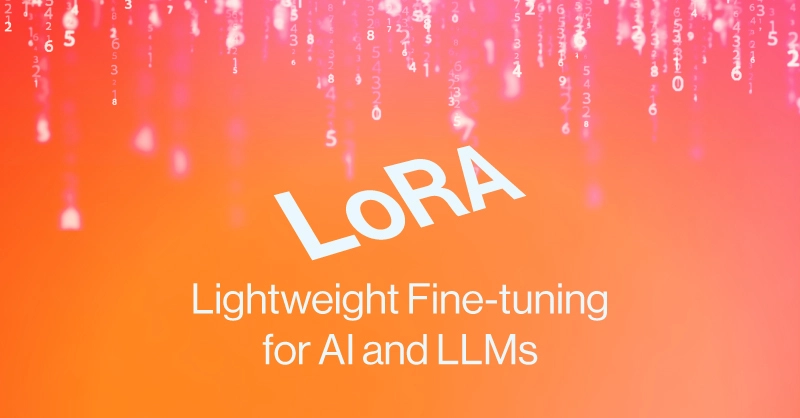Introduction
Training or fine-tuning a foundation model from scratch is out of reach for most organizations—it demands enormous GPU clusters, vast memory, and weeks of runtime. LoRA makes fine-tuning high-parameter models more efficient.
What is LoRA (Low-Rank Adaptation)?
Low-Rank Adaptation (LoRA) is a method for fine-tuning large language models (LLMs) without retraining every parameter. Instead, LoRA uses small, trainable matrices into the network, while the base AI model remains frozen. These matrices capture the adjustments needed for a new task, dramatically reducing the compute and memory required for complete re-training.
- Lower Costs – A single workstation or a few GPUs can now handle fine-tuning tasks once reserved for hyperscalers.
- Faster Iteration – Train and deploy domain-specific models in hours or days, not weeks.
- Flexibility – Keep the same base model and apply multiple LoRA adapters for different use cases.
- Scalability – Easier to integrate into real-world production without overwhelming infrastructure.
For businesses, this means faster time-to-market with AI products and lower hardware investment. Training from scratch is unrealistic, but LoRA makes customization possible:
- Customer Support & Chatbots – Fine-tune a base model with company-specific FAQs and policies to provide accurate, branded responses.
- Healthcare & Life Sciences – Adapt models to interpret clinical notes, medical literature, or lab reports without exposing sensitive data.
- Financial Services – Teach models domain-specific terminology for tasks like risk analysis, compliance checks, or financial document parsing.
- Legal & Compliance – Fine-tune on contracts, case law, and regulations to improve document review and legal research.
- Engineering & Technical Fields – Train on internal documentation, CAD instructions, or simulation logs to assist engineers in specialized workflows.
LoRA reduces the hardware and time investment needed for these adaptations, enabling organizations to move from generic AI to domain-optimized AI faster.

Hardware Considerations
LoRA reduces overhead, but success still depends on the right system design:
- GPU Memory – With fewer trainable parameters, fine-tuning fits within 24–48GB GPUs, making workstation-class hardware viable.
- Tensor Core Utilization – Modern GPUs with strong tensor performance (e.g., RTX PRO 6000 Blackwell, NVIDIA H200 NVL, and RTX 6000 Ada) provide the best GPU memory capacity and acceleration.
- Storage Efficiency – Storing multiple LoRA adapters takes a fraction of the space of full checkpoints, easing deployment at scale.
- Cluster Advantage – For organizations fine-tuning larger base models, GPU clusters remain valuable, but LoRA ensures resources are used efficiently.
FAQ About LoRA
Is LoRA only for language models?
No. While popularized with LLMs, LoRA can be applied to other transformer-based models, including vision and speech.
Does LoRA hurt accuracy?
Performance is often comparable to full fine-tuning, especially for domain-specific tasks. In some cases, it even improves generalization.
How big are LoRA adapters?
They are lightweight—often just a few hundred MB versus tens or hundreds of GB for a full fine-tuned model.
Can LoRA work with open-source models?
Yes. Many open-source LLMs like LLaMA, Falcon, and MPT support LoRA fine-tuning.
Is LoRA a replacement for GPUs?
No. GPUs are still essential, but LoRA reduces the scale of hardware required to achieve meaningful results.
Final Thoughts
LoRA is more than a clever training shortcut that enables organizations to leverage massive foundation models without the massive infrastructure. By pairing LoRA with purpose-built hardware, teams can accelerate fine-tuning, reduce costs, and deploy AI solutions tailored to their domain. Follow HuggingFace’s LoRA Guide for comprehensive information and tutorials on how to deploy this in your organization.
At SabrePC, we specialize in offering configurable platforms optimized for modern AI techniques like LoRA, ensuring you get the customizability of your computing infrastructure. Contact us today for a quote on the system you're looking for!


